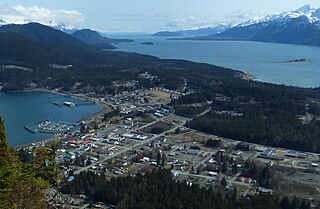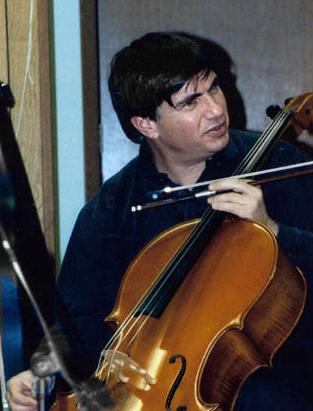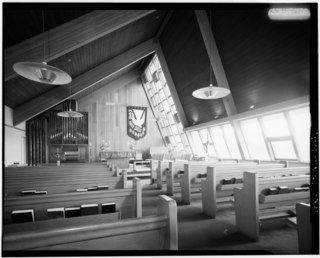
The Sitka Summer Music Festival is a month-long classical chamber music festival in Sitka, Alaska.

The Sitka Summer Music Festival is a month-long classical chamber music festival in Sitka, Alaska.
The festival takes place in early summer during the month of June with three groupings of musicians. Each group of musicians performs three concerts before a new group arrives to perform the next three concerts.
Each season of the festival consists of around ten evening concerts, the centerpieces of the festival, as well as several free, informal "brown bag" concerts and multiple fundraising events and cruises.
All the evening concerts occur at the breathtaking venue of Harrigan Centennial Hall, in downtown Sitka. While it is not an auditorium (rather, the main hall of a convention/civic center), its glass-panel backdrop reveals a clear view of Crescent Harbor, Eastern Channel and its assortment of small, tree-covered islands dotting its water, snow-capped mountains, and an occasional bald eagle swooping down from the sky.
The organization's offices are located in Stevenson Hall on the campus of the former Sheldon Jackson College in Sitka. Stevenson Hall is part of the National Historic Landmark District created in 2001. The hall was built in 1911 as part of the central campus. [1]
The festival's sheet music library is housed in Stratton Library, also on the campus of the former Sheldon Jackson College.
The artistic director is Zuill Bailey.
The festival also offers a series of Autumn and Winter Classics at Alaska Pacific University in Anchorage, where the festival's full-time office is located. During February and June the festival also offers a winter and summer touring series sending a small group of musicians (a piano quintet at most) to a number of small, usually rural communities throughout the state. The winter series visits different communities each year, Sitka notwithstanding, which always hosts the finale concert.
The festival began in 1972 as an informal musical reunion, organized by Paul Rosenthal, of the students of Jascha Heifetz and Gregor Piatigorsky from the University of Southern California. Their concerts were a success and the reunion became an annual festival directed by Rosenthal, growing larger throughout the years. The Autumn and Winter Classics in Anchorage were begun in 1980 and have also continued since.
The festival went virtual in 2020 as officials blamed the COVID-19 pandemic as grounds for cancelling live concerts.
While there have been 110 festival musicians since its inception in 1972, a list of the more notable musicians classified by instrument is below:
A full list of musicians.

Alaska is a non-contiguous U.S. state on the northwest extremity of North America. It borders British Columbia and Yukon in Canada to the east and it shares a western maritime border in the Bering Strait with Russia's Chukotka Autonomous Okrug. The Chukchi and Beaufort Seas of the Arctic Ocean lie to the north and the Pacific Ocean lies to the south. Technically a semi-exclave of the U.S., Alaska is the largest exclave in the world.

The City and Borough of Juneau, more commonly known simply as Juneau, is the capital city of the U.S. state of Alaska. Located in the Gastineau Channel and the Alaskan panhandle, it is a consolidated city-borough and the second-largest city in the United States by area. Juneau was named the capital of Alaska in 1906, when the government of what was then the District of Alaska was moved from Sitka as dictated by the U.S. Congress in 1900. The municipality unified on July 1, 1970; the city of Juneau merged with the city of Douglas and the surrounding Greater Juneau Borough to form the current municipality, which is larger by area than both Rhode Island and Delaware.

Sitka is a unified city-borough in the southeast portion of the U.S. state of Alaska. It was under Russian rule from 1799 to 1867. The city is situated on the west side of Baranof Island and the south half of Chichagof Island in the Alexander Archipelago of the Pacific Ocean. As of the 2020 census, Sitka had a population of 8,458, making it the fifth-most populated city in the state.

Haines is a census-designated place located in Haines Borough, Alaska, United States. It is in the northern part of the Alaska Panhandle, near Glacier Bay National Park and Preserve.

Sheldon Jackson College (SJC) was a small private college located on Baranof Island in Sitka, Alaska, United States. Founded in 1878, it was the oldest institution of higher learning in Alaska and maintained a historic relationship with the Presbyterian Church. The college was named in honor of Rev. Sheldon Jackson, an early missionary and educational leader in Alaska.
The music of Alaska is a broad artistic field incorporating many cultures.
Sitka Jazz Festival is a three-day jazz festival in the community of Sitka, Alaska that takes place every February. It features educational clinics for participating students, evening concerts featuring professional jazz artists, and the All-Alaska Jazz Band—an audition-entrance honor ensemble for Alaskan high school students.
Jennifer Stumm is a concert violist, professor of viola at the University of Music and Arts of the City of Vienna and director of the Ilumina Festival in São Paulo.
James Zuill Bailey, better known as Zuill Bailey is a celebrated, Grammy Award-winning American cello soloist, chamber musician, and artistic director. A graduate of the Peabody Institute of the Johns Hopkins University and the Juilliard School, he has appeared in recital and with major orchestras internationally. He is a professor of cello and Director of the Center for Entrepreneurship at the University of Texas at El Paso. Bailey’s extensive recording catalogue are released on TELARC, Avie, Steinway and Sons, Octave, Delos, Albany, Sono Luminus, Naxos, Azica, Concord, EuroArts, ASV, Oxingale and Zenph Studios.

The Municipality of Anchorage is the largest city in the U.S. state of Alaska by population. With a population of 291,247 at the 2020 census, it contains nearly 40 percent of the state's population, and has more people than all of Northern Canada and Greenland combined. The Anchorage metropolitan area, which includes Anchorage and the neighboring Matanuska-Susitna Borough, had a population of 398,328 in 2020, accounting for more than half the state's population. At 1,706 sq mi (4,420 km2) of land area, the city is the fourth-largest by area in the United States and larger than the smallest state, Rhode Island, which has 1,212 sq mi (3,140 km2).
Prince William Sound College is a college located at 303 Lowe St. in Valdez, Alaska. PWSC comprises one main campus in Valdez and extension campuses in Glennallen and Cordova. The college is part of the University of Alaska Anchorage under the aegis of the University of Alaska System.

The following outline is provided as an overview of and topical guide to the U.S. state of Alaska:

Jeffrey Solow is an American cellist.
Philip Munger is an American composer, music educator, political blogger, and environmentalist living in Alaska. He is perhaps best known for "The Skies are Weeping", a seven-movement cantata written in tribute to Rachel Corrie, an American member of the International Solidarity Movement killed in 2003 by a bulldozer operated by the Israel Defense Forces while she tried to prevent a house demolition in the southern Gaza Strip during the Second Intifada. He currently lectures on cultural history at two campuses of the University of Alaska Anchorage and occasionally teaches tuba at the main Anchorage campus. He was born in 1946 and attended Oberlin Conservatory and the University of Washington, where he studied musical composition.

Sitka Fine Arts Camp is a nationally-recognized fine arts summer camp located in Sitka, Alaska. The camp was established in 1973 at Sheldon Jackson College. It used other locations in the years that followed before acquiring the majority of historic Sheldon Jackson College buildings and campus in 2011. It took almost four years for a USDA Rural Development loan to be transferred from the college to the camp because of a "maze of paperwork," but it was done in 2013.

Nicholas Galanin is a Tlingit and Unangax̂ multi-disciplinary artist and musician from Alaska. His work often explores a dialogue of change and identity between Native and non-Native communities.
The Roanoke Symphony Orchestra, also known as the "RSO", was established in 1953 by Gibson Morrissey and a number of other music lovers. Gibson Morrissey served as the conductor until his death in 1975.

Sitka Lutheran Church is an Evangelical Lutheran Church in Sitka, Alaska. Its first building was constructed in 1843 on what is now 224 Lincoln Street and was the first Protestant church in Alaska. The original church was built and its congregation established through the efforts of Arvid Adolf Etholén, the eighth Russian governor of Alaska. The land on which the church was constructed was deeded to the congregation in perpetuity by the Russian government at the time of the Alaska Purchase. The current church building is the third to be constructed on the site and was completed in 1967. It contains many of the furnishings from the original church, including its historic pipe organ and the altarpiece by Berndt Godenhjelm.
Elaine Elizabeth Abraham was a Yakutat Tlingit Tribe elder and registered nurse who contributed to improving health care delivery in rural Alaska. Later active professionally in the field of education, she assisted with the creation of the Alaska Native Language Center, and, as a statewide administrator at the University of Alaska, in 1976, led the establishment of community colleges in underserved parts of the state.

Edwin Butler Crittenden (1915-2015) was an American architect practicing in Anchorage, Alaska. Referred to later in life as the "dean of Alaska architecture", he was the most notable Alaskan architect of the 20th century.